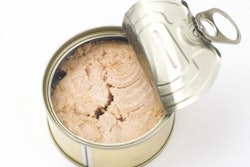An agricultural-appropriations bill in the House that would require the USDA to come up with a revision to its "Buy American" benchmark so more companies could compete in the lucrative school-lunch tuna market could be released as early as this week. The "Buy American" rules on tuna, rules that require tuna makers to clean, can, and ship their product in U.S.-run facilities, have companies Bumble Bee and Chicken of the Sea left out of the school-lunch market because both companies clean their tuna overseas.
StarKist operates in American Samoa, a U.S. territory where Tri Marine is building a facility. Making the issue more contentious are concerns about child-labor laws and cruel conditions for tuna-factory workers.
"I suspect most members don't have the facts yet on where Bumble Bee and Chicken of the Sea source their tuna," said Jim Bonham, of Manatt, Phelps & Phillips, a Los Angeles-based law firm that lobbies for StarKist and Tri Marine. American Samoa officials have criticized both Bumble Bee and Chicken of the Sea for using facilities in Thailand unfit for employees.
"It is disgraceful to suggest that poor kids in Asia should be forced to provide tuna sandwiches for America's school-lunch program," American Samoa Delegate Eni Faleomavaega told The Hill. "It is time for America to know the truth about Bumble Bee and Chicken of the Sea."
Proposed language altering the "Buy American" provision includes "the option for less than 100 percent of the value of the tuna product be United States produced." American Samoa officials oppose the language and have sent letters to House Minority Leader Nancy Pelosi, Senate Majority Leader Harry Reid, and others on Capitol Hill.
Rep. Linda Sánchez last year introduced legislation to change the "Buy American" standards. Coincidentally, Bumble Bee has a cannery in Santa Fe Springs, Calif., which is part of Sánchez's district.?
"It simply provides more flexibility to the Department of Agriculture's canned-tuna purchasing program," said Mattie Muñoz, a spokeswoman for Sánchez. "The Tuna Competition Act is designed to bolster domestic industry.Congresswoman Sanchez is always happy to fight for job creators in the 38th District, however, it is important to note that this bill will help U.S. tuna producers nationally."
To read more, click HERE.

















